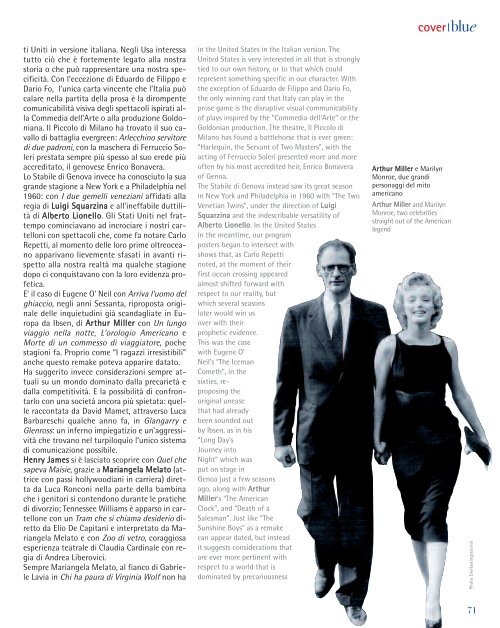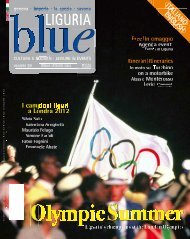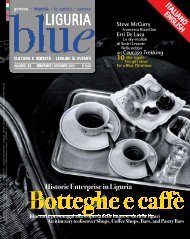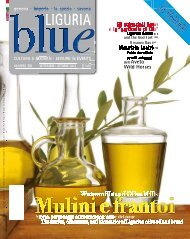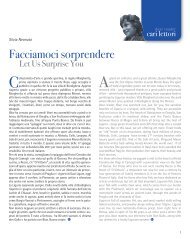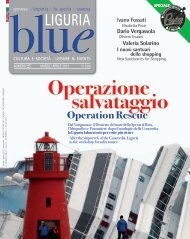Download PDF - Blue Liguria - Sagep
Download PDF - Blue Liguria - Sagep
Download PDF - Blue Liguria - Sagep
Create successful ePaper yourself
Turn your PDF publications into a flip-book with our unique Google optimized e-Paper software.
cover<br />
blue<br />
ti Uniti in versione italiana. Negli Usa interessa<br />
tutto ciò che è fortemente legato alla nostra<br />
storia o che può rappresentare una nostra specificità.<br />
Con l’eccezione di Eduardo de Filippo e<br />
Dario Fo, l’unica carta vincente che l’Italia può<br />
calare nella partita della prosa è la dirompente<br />
comunicabilità visiva degli spettacoli ispirati alla<br />
Commedia dell’Arte o alla produzione Goldoniana.<br />
Il Piccolo di Milano ha trovato il suo cavallo<br />
di battaglia evergreen: Arlecchino servitore<br />
di due padroni, con la maschera di Ferruccio Soleri<br />
prestata sempre più spesso al suo erede più<br />
accreditato, il genovese Enrico Bonavera.<br />
Lo Stabile di Genova invece ha conosciuto la sua<br />
grande stagione a New York e a Philadelphia nel<br />
1960: con I due gemelli veneziani affidati alla<br />
regia di Luigi Squarzina e all’ineffabile duttilità<br />
di Alberto Lionello. Gli Stati Uniti nel frattempo<br />
cominciavano ad incrociare i nostri cartelloni<br />
con spettacoli che, come fa notare Carlo<br />
Repetti, al momento delle loro prime oltreoceano<br />
apparivano lievemente sfasati in avanti rispetto<br />
alla nostra realtà ma qualche stagione<br />
dopo ci conquistavano con la loro evidenza profetica.<br />
E’ il caso di Eugene O’ Neil con Arriva l’uomo del<br />
ghiaccio, negli anni Sessanta, riproposta originale<br />
delle inquietudini già scandagliate in Europa<br />
da Ibsen, di Arthur Miller con Un lungo<br />
viaggio nella notte, L’orologio Americano e<br />
Morte di un commesso di viaggiatore, poche<br />
stagioni fa. Proprio come “I ragazzi irresistibili”<br />
anche questo remake poteva apparire datato.<br />
Ha suggerito invece considerazioni sempre attuali<br />
su un mondo dominato dalla precarietà e<br />
dalla competitività. E la possibilità di confrontarlo<br />
con una società ancora più spietata: quelle<br />
raccontata da David Mamet, attraverso Luca<br />
Barbareschi qualche anno fa, in Glangarry e<br />
Glenross: un inferno impiegatizio e un’aggressività<br />
che trovano nel turpiloquio l’unico sistema<br />
di comunicazione possibile.<br />
Henry James si è lasciato scoprire con Quel che<br />
sapeva Maisie, grazie a Mariangela Melato (attrice<br />
con passi hollywoodiani in carriera) diretta<br />
da Luca Ronconi nella parte della bambina<br />
che i genitori si contendono durante le pratiche<br />
di divorzio; Tennessee Williams è apparso in cartellone<br />
con un Tram che si chiama desiderio diretto<br />
da Elio De Capitani e interpretato da Mariangela<br />
Melato e con Zoo di vetro, coraggiosa<br />
esperienza teatrale di Claudia Cardinale con regia<br />
di Andrea Liberovici.<br />
Sempre Mariangela Melato, al fianco di Gabriele<br />
Lavia in Chi ha paura di Virginia Wolf non ha<br />
in the United States in the Italian version. The<br />
United States is very interested in all that is strongly<br />
tied to our own history, or to that which could<br />
represent something specific in our character. With<br />
the exception of Eduardo de Filippo and Dario Fo,<br />
the only winning card that Italy can play in the<br />
prose game is the disruptive visual communicability<br />
of plays inspired by the “Commedia dell’Arte” or the<br />
Goldonian production. The theatre, Il Piccolo di<br />
Milano has found a battlehorse that is ever green:<br />
“Harlequin, the Servant of Two Masters”, with the<br />
acting of Ferruccio Soleri presented more and more<br />
often by his most accredited heir, Enrico Bonavera<br />
of Genoa.<br />
The Stabile di Genova instead saw its great season<br />
in New York and Philadelphia in 1960 with “The Two<br />
Venetian Twins”, under the direction of Luigi<br />
Squarzina and the indescribable versatility of<br />
Alberto Lionello. In the United States<br />
in the meantime, our program<br />
posters began to intersect with<br />
shows that, as Carlo Repetti<br />
noted, at the moment of their<br />
first ocean crossing appeared<br />
almost shifted forward with<br />
respect to our reality, but<br />
which several seasons<br />
later would win us<br />
over with their<br />
prophetic evidence.<br />
This was the case<br />
with Eugene O’<br />
Neil’s “The Iceman<br />
Cometh”, in the<br />
sixties, reproposing<br />
the<br />
original unease<br />
that had already<br />
been sounded out<br />
by Ibsen, as in his<br />
“Long Day’s<br />
Journey into<br />
Night” which was<br />
put on stage in<br />
Genoa just a few seasons<br />
ago, along with Arthur<br />
Miller’s “The American<br />
Clock”, and “Death of a<br />
Salesman”. Just like “The<br />
Sunshine Boys” as a remake<br />
can appear dated, but instead<br />
it suggests considerations that<br />
are ever more pertinent with<br />
respect to a world that is<br />
dominated by precariousness<br />
Arthur Miller e Marilyn<br />
Monroe, due grandi<br />
personaggi del mito<br />
americano<br />
Arthur Miller and Marilyn<br />
Monroe, two celebrities<br />
straight out of the American<br />
legend<br />
Photo Everlastingstar.net<br />
71


